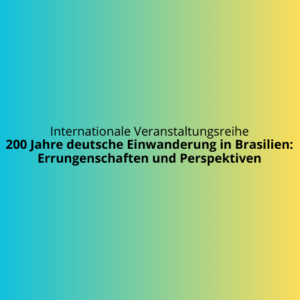200 Years of German Immigration to Brazil: Achievements and Perspectives
The year 2024 marks the bicentenary of the first wave of German-Speaking migration to Brazil. At the beginning of the 19th century, Europe was facing political and economic instability, with wars and agricultural crises that led many Europeans to seek better living conditions on other continents. During this period, shortly after Brazil’s independence in 1822, the Brazilian empire encouraged immigration. Thus, the first large wave of German immigrants arrived in Brazil around July 25, 1824, settling in São Leopoldo, in the then Province of São Pedro do Rio Grande do Sul (currently Rio Grande do Sul). Most of the immigrant groups of the first half of the 19th century came from the Rhenish-Franconian and Moselle-Franconian Hunsrück and founded their first colonies in the area around the capital Porto Alegre.
In the second half of the 19th century, groups of German-speaking immigrants from other areas such as Pomerania, Westphalia, Bohemia, Saxony, Thuringia, Bavaria, South Tyrol, Romania, the Volga region (present-day Ukraine), and Switzerland followed. They brought with them their cultures, new agricultural cultivation techniques, and different varieties of the German language, many of which continue to be used and passed on to subsequent generations to this day.

Over time, German-speaking groups integrated into Brazilian society, maintaining some of their traditions while adopting aspects of local culture. Currently, it is estimated that there are 1.2 million speakers of German as a minority language in Brazil, making it the country with the second-highest number of speakers of German as a minority language in the world.
To celebrate this anniversary, the Leitorado Brasileiro Guimarães Rosa (IGR/HCIAS) and the Institute of German Philology as a Foreign Language (IDF) at the University of Heidelberg are organizing an international series of events entitled “200 Years of German Immigration to Brazil: Achievements and Perspectives”. Coordinated by Marília Pinheiro Pereira (IGR/HCIAS) and Angelica Prediger (IDF), the objective of this international series of events is to celebrate this occasion with students, teachers, researchers and all interested people, not only on the official day (July 25th), but throughout 2024. To this end, we have prepared lectures on the topic of immigration from linguistic, historical, social and political perspectives for both the academic community and the general public. Above all, lectures related to the variety of German spoken in Brazil, highlighting progress in the study of German as a minority, foreign and second language. In addition, we are also planning cultural activities for the community. For more information about our agenda, click here and to read about previous lectures click here.
CALL FOR PAPERS!
Thematic Volume: 200 Years of German-Speaking Migrations to Brazil
Angélica Prediger and Marília Pinheiro Pereira invite contributions from scholars in linguistics, literature, German as a Foreign/Second Language (DaF/DaZ), and related disciplines.
-
January 12, 2025: Submit the provisional title of your article.
-
May 31, 2025: Submit the final manuscript.
Click on the image for more information. ⇥ ⇥ ⇥
Click here to download the document with the guidelines.
Click here to download the stylesheet for quotations and references.
Guidelines:
-
Articles should not exceed 20 pages.
-
Papers will undergo a double-blind peer review.
-
Languages accepted: German, Portuguese, Spanish, and English.
Topics:
Contributions may focus on the following themes, with relevance to migration in Brazil, Latin America, or the Americas:
Part A: Historical and Cultural Aspects
- Little-known histories of German-speaking immigration.
- Interethnic/linguistic interactions, including with Indigenous and Afro-descendent communities.
- Women’s roles in migrant societies.
- Literature and media in the context of German-speaking immigration.
Part B: Linguistic Studies
- Language variation, acquisition, and change.
- Everyday writing practices of German varieties.
- Gender-specific language variations and women’s naming.
- Onomastic studies (e.g., names and linguistic landscapes).
Part C: Language Teaching
-
Multilingualism and language awareness in German teaching (DaF/DaZ).
-
Decolonial perspectives in language education.
-
Teacher development, material creation, and curriculum design for German.
Part D: Ideologies and Policies
- Language ideologies in immigration contexts.
- Minority language policies, including German varieties.
- Constructing linguistic, ethnic, and gender identities.
Submission:
Send contributions to prediger@idf.uni-heidelberg.de and/or marilia.pinheiro_pereira@uni-heidelberg.de.
We look forward to your submissions!

